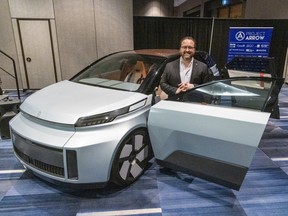
Article content
Canada’s auto sector has been moving backward for the past decade, with overall vehicle production dropping 45 per cent to about 1.3 million vehicles last year from 2.4 million in 2014, but it’s now facing perhaps its biggest challenge yet: its biggest customer, the United States, says it no longer wants Canadian-made vehicles.
THIS CONTENT IS RESERVED FOR SUBSCRIBERS ONLY
Subscribe now to read the latest news in your city and across Canada.
- Exclusive articles from Barbara Shecter, Joe O'Connor, Gabriel Friedman, and others.
- Daily content from Financial Times, the world's leading global business publication.
- Unlimited online access to read articles from Financial Post, National Post and 15 news sites across Canada with one account.
- National Post ePaper, an electronic replica of the print edition to view on any device, share and comment on.
- Daily puzzles, including the New York Times Crossword.
SUBSCRIBE TO UNLOCK MORE ARTICLES
Subscribe now to read the latest news in your city and across Canada.
- Exclusive articles from Barbara Shecter, Joe O'Connor, Gabriel Friedman and others.
- Daily content from Financial Times, the world's leading global business publication.
- Unlimited online access to read articles from Financial Post, National Post and 15 news sites across Canada with one account.
- National Post ePaper, an electronic replica of the print edition to view on any device, share and comment on.
- Daily puzzles, including the New York Times Crossword.
REGISTER / SIGN IN TO UNLOCK MORE ARTICLES
Create an account or sign in to continue with your reading experience.
- Access articles from across Canada with one account.
- Share your thoughts and join the conversation in the comments.
- Enjoy additional articles per month.
- Get email updates from your favourite authors.
THIS ARTICLE IS FREE TO READ REGISTER TO UNLOCK.
Create an account or sign in to continue with your reading experience.
- Access articles from across Canada with one account
- Share your thoughts and join the conversation in the comments
- Enjoy additional articles per month
- Get email updates from your favourite authors
Sign In or Create an Account
or
Article content
Article content
“It’s unprecedented,” Flavio Volpe, president of the Automotive Parts Manufacturers’ Association, an industry lobby group, told an audience at the Canadian Club in Toronto on Wednesday about President Donald Trump saying his country does not want Canadian-made vehicles anymore. “We don’t have a negotiating table and I actually don’t know what the next step is.”
Article content
Article content
Volpe was joined by Rob Wildeboer, executive chairman of Martinrea International Inc., one of Canada’s largest auto-parts companies, and others to discuss whether Canadian policymakers could help create a self-sufficient homegrown auto industry, how to support existing companies and what an ideal regulatory situation would look like.
Article content
“We’re used to being punched in the face,” Wildeboer said, recounting how the 9/11 terrorist attacks, the 2008-09 financial crisis and the pandemic’s supply chain challenges have hobbled the sector in the past.
Article content
More recently, the Trump administration repeatedly threatened to impose tariffs and then followed through in early April with 25 per cent tariffs.
Article content
Wildeboer said he travelled to Washington, D.C., twice, even making it inside the West Wing, to meet with Trump’s top policy advisers, whom he warned that the North American auto production system is so integrated that any tariffs on Canadian or Mexican auto parts would quickly shut down production.
Article content
Article content
He said the advisers took notes and eventually listened, as far as auto parts tariffs go, at least so far. Nonetheless, automakers have already warned the tariffs on finished vehicles will eat up billions of dollars in profits at a time when they face the costly task of reinventing themselves as the electric vehicle transition accelerates.
Article content
Article content
“That’s the nature of how policy is going,” Wildeboer said. “In my view, if you try to figure out one word for it, I would call it incoherent. That doesn’t mean that we can’t lurch towards something that’s really good.”
Article content
Article content
What “really good” could look like at its simplest, he said, is completely free trade on auto parts in North America, and more rules around using only North American parts in vehicles, with higher penalties for non-compliance.
Article content
Wildeboer also said there need to be new rules that penalize automakers from Europe, Japan, Korea and elsewhere that sell a lot of cars in North America, but don’t manufacture here.
Article content
However, he said Chinese automakers and parts companies need to be kept out of the market.
Article content
“They cheat,” he said, saying their companies receive too many government subsidies for Western companies to compete.
Article content
Volpe made similar points about renegotiating a free trade agreement that brings more auto production back to North America, but he also characterized the industry’s problem as a failure of imagination.
Article content
In 2023, he spearheaded Project Arrow, which made a prototype vehicle entirely from Canadian parts. It was not made as a potential product for sale, but more as a publicity stunt to show people the depth and breadth of the industry and spur entrepreneurs to imagine what is possible, he said.

.jpg) 4 hours ago
1
4 hours ago
1
 English (US)
English (US)